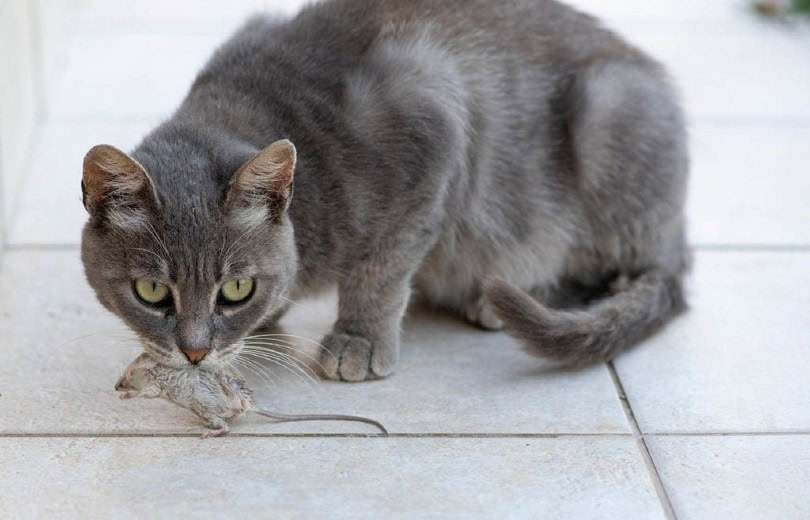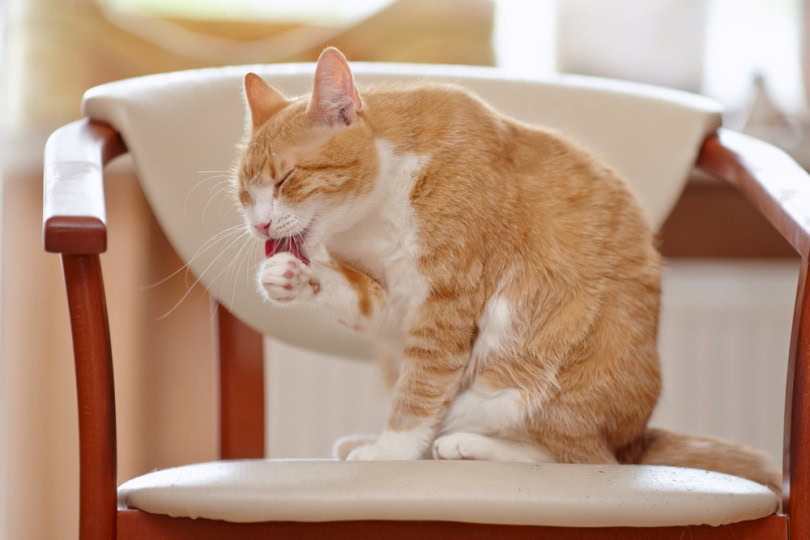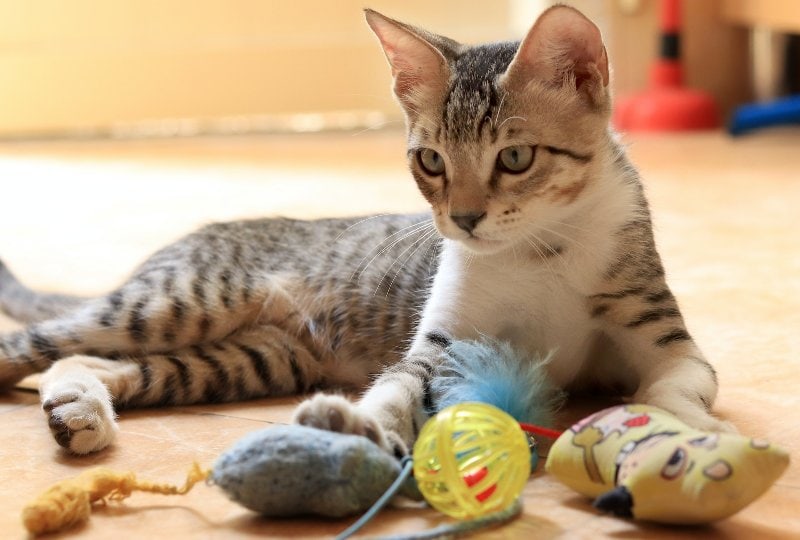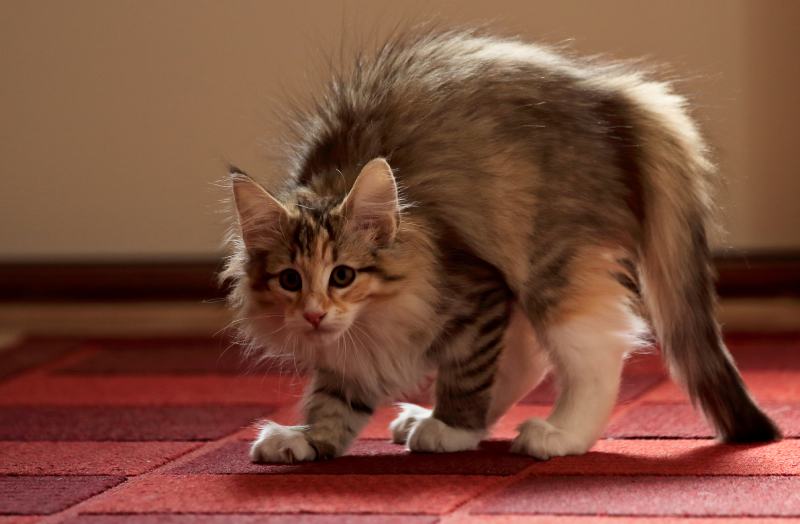VET APPROVED

The information is current and up-to-date in accordance with the latest veterinarian research.
Learn more »It’s something many cat owners have experienced. You let your kitty go outside only to find a dead mouse on your doormat hours later, or—heaven forbid—still alive on the kitchen floor. Many people refer to this behavior as your pet bringing you a gift, but it’s not that simple, as sweet as it sounds.
Bringing their prey back home is actually a part of feline instinctive prey drive, bringing the animal they caught back home to safety. Another important point to consider is the significant impact our feline friends have on local wildlife, mainly bird and rodent species.
Let’s look into the few possible reasons cats bring dead (or live) animals back home, unraveling some myths and anecdotes, and focusing on explanations backed up by science and observation of feline behavior.

Possible Reasons Why Cats Bring You Dead Animals as Gifts
Instinct Behind The Drive
It’s safe to say that cats have their own way of viewing the world. They don’t act like dogs. Instead, they seem like they’re more in touch with their wild side than our canine best friends. That’s a fair assumption, considering that felines lived near humans but not necessarily with them, at least initially. Perhaps it’s true even today. After all, how many pet owners would let their dogs out for the night?
Living with humans changed canine behavior tremendously through the centuries. It’s worth noting that people domesticated dogs more than 30,000 years ago.1 We didn’t get around to doing the same with cats until around 10,000 years ago.2 That means our feline companions are indeed more in touch with their wild side. Many behaviors are reflections of their lives before they became pets.
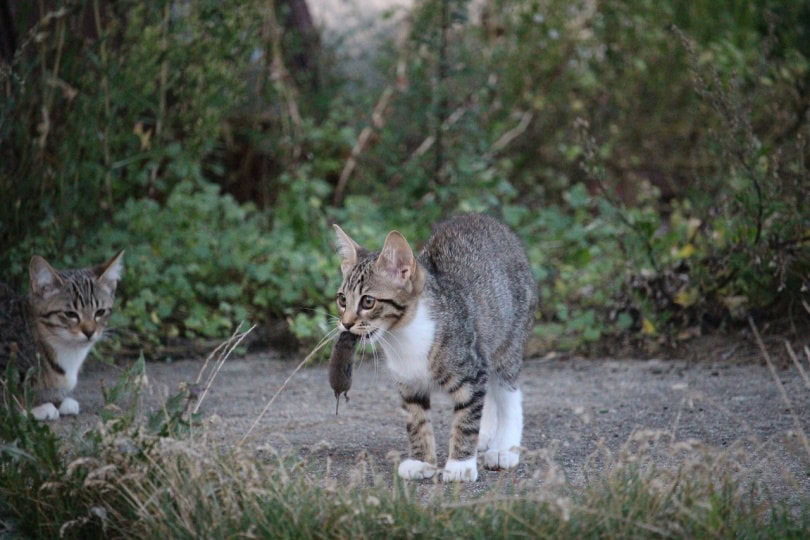
Think about some common actions you’ve undoubtedly observed in your cat, such as their pouncing on toys or stalking birds they see outside your home’s window. Your cat’s hunting is simply instinct kicking in and letting their prey drive to take over. They don’t need to feel hungry to hunt, and will often seem like they are playing with their prey before either eating it or losing interest in it altogether. This way they tire the animal out. They bring home their prize because that’s where they live.
Your pet has figured out that it’s a safe place where they can eat without worrying they will be disturbed or attacked by another animal, losing their food. Why not take their prey there?
It’s worth noting that some felines, like leopards, hide their food. These felines will haul their prey into a tree to keep it safe. Other animals exhibit similar behavior, such as squirrels burying nuts they’ve found. Scientists have also observed the European Wild Cat caching away its food. Domestic cats may also be doing the same by bringing their prey home and saving it for later.
Survival
It’s a tough life being a predator. After all, it’s not a given that you’ll always be successful when you hunt. The percentage of kills is surprisingly low, especially for animals that hunt alone, unlike pack animals. African Wild Dogs are the luckiest, with an 85% success rate. Felines aren’t as fortunate. Even lions only bring home food 25% of the time. Domestic cats outdo the king of the jungle at 32%.
If your pet takes their prey home, they’re taking advantage of a successful hunt, even if they’re not going to eat it right away. Food is hard to come by in the wild and even harder to keep safe.
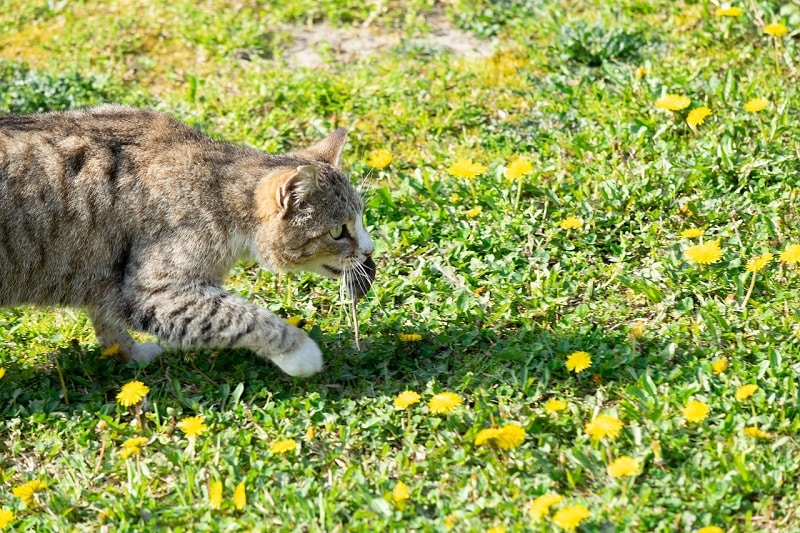
Teaching Their Young
Some question whether cats are bringing their prey back home, as a way to teach their young how to hunt and kill. Mother cats certainly do this with their kittens, who can then play with the prey before the mother kills it. However, many cats today are neutered and do not have kittens. It may be that this instinct remains, but most likely it’s all about the safety of their home, where they can enjoy their prey undisturbed.
Various Myths and Anecdotes
Some pet owners like to think of their cats bringing home dead animals as an act of love. Scientists have explored the bond dogs share with humans with a lot of research. We know much more about our relationship with canines than felines. However, interest has increased with more exploration into these bonds. Science has uncovered evidence that cats form bonds with their owners.
We’ve learned that our pets may also be able to read some of our emotions. They can recognize their names and discriminate them from other words. They seem to figure out our schedules to greet us when we come home. Many of us would call that love based on our values, but it’s actually anthropomorphizing cats. We lavish our cats with food, treats, and toys. Our heart tells us that our pets are showing the same emotion. It may not be science, but it certainly feels good when your kitty cuddles up alongside you.
The idea of our cats bringing us mice in order to show us how to hunt or to provide for us and deepen our bond, as sweet as it sounds, will remain just that, wishful thinking, as we have come to know the truth behind cats bringing their prey home, that relies solely on instinctive behavior.
Impact on Wildlife
As inconvenient as it is, and often gross if we’re being honest, disposing of a killed bird or small mammal, cats’ hunting behavior has a significant impact on the numbers of wild animals.
Domestic cats seem to have taken the title of one of the worst invasive species worldwide, contributing to the extinction of 63 species of birds, small mammals, and reptiles.3 Adding a bell or two on their quick-release collars may warn some animals about your cat’s presence, but it may have a limited effect. There are other ways you can implement to reduce your cat’s hunting, for both your sake and the wild animals.
If you do come across a wild animal that has been injured by your cat, it’s best to take them to a local vet or wildlife rehab center, where they can receive the care they need. However, use gloves and be careful not to get injured or bitten in the process.
Reducing This Behavior
We understand why you wouldn’t want your cat to share their prey. It’s not pleasant if you have to dispatch the rodent yourself. Although you might be unable to stop your kitty from acting instinctively, you can do some things to reduce their hunting and the impact they have on local wildlife.
One is to limit your cat’s outdoor time, by ensuring they are inside from dusk until late dawn, as they are most active during dusk and dawn. Not to mention, this will also help keep your kitty safe. Playing with your cat regularly and getting them to use up their energy on a daily basis will also reduce their need to hunt outside.
Survival and instinct kick in when food isn’t plentiful. These things will encourage a cat to hunt and maybe bring their catch home to enjoy it in safety. We recommend giving your pet a high-protein meat-based diet. A sated pet may be less likely to look for food elsewhere. We suggest feeding your cat food formulated for their life stage, following the manufacturer’s recommended portion and your veterinarian’s advice. That will keep your kitty feeling sated longer and less likely to look to supplement it.
Rodents and other wildlife may carry parasites, fleas, ticks, and other potential disease-causing microorganisms that can put you, your pet, and your family at risk of health conditions. Of course, one of the best solutions is to keep your pet indoors, still ensuring they can exhibit their natural behavior in controlled and enriched environments, such as an outdoor secure catio and through plenty of interactive playtime.
If you are concerned about your cats behavior, we suggest speaking to a vet to find more ways to discourage unwanted habits.

Conclusion
Many animals operate on autopilot with instinctive behaviors that can help ensure their survival. Your cat probably acts the same way. Bringing food to their home provides a safe place for them to enjoy their hard-won feast away from other predators that might try to steal it.
However, alongside serious implications for local wildlife and certain health risks, there is also the fact that oftentimes you’re the one needing to dispose of the killed prey, which is everything but pleasant. Consider some of the recommended ways to minimize your cat’s hunting and reduce the likelihood of your kitty bringing you these unwanted gifts.
- A Brief History of House Cats | Smithsonian
- Domestic cats (Felis catus) discriminate their names from other words | Scientific Reports
- Attachment bonds between domestic cats and humans: Current Biology
- Deadliest apex predators in the wild: which mammals are the best killing machines?
- A small cat saving food for later: caching behavior in the European wildcat (Felis silvestris silvestris) | European Journal of Wildlife Research
- Cats Domesticated Themselves, Ancient DNA Shows
- The Origins Of Cats | International Cat Care
- Why Do Cats Bring Home Dead Animals? | Weddington Animal Hospital
- Blog – Why do cats bring you dead animals?
- Human-Dog Relationship – A Historical Perspective | Boehringer Ingelheim
- Cats and Birds | American Bird Conservancy
Featured Image Credit: Markos-Loizou, Shutterstoc
